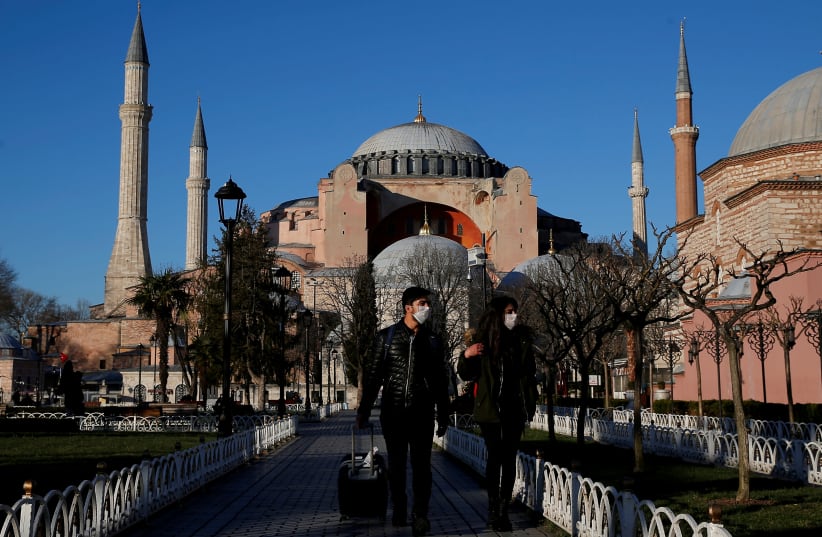Tourism Minister Mehmet Nuri Ersoy said the program would start in the first week of May, according to the country’s state news agency, but did not provide details, including how Turkey would convince other nations to recognize it.
Ahmet Aras, mayor of the popular resort town of Bodrum and a member of the opposition Republican People’s Party (CHP), told The Media Line he believed the plan could benefit the country.
“We support [the] certificate program,” Aras wrote in a message. “Tourists will prefer more hygienic destinations than others…. After COVID-19, the concept of ‘normal’ will change.”
Aras added that a commission had been set up in his city, which he said had 1.5 million foreign tourists last year, to prepare for changes.
Ersoy said the program included training for workers, plans for the sterilization of vehicles, hotels, airports and restaurants, and requirements for visitors to show health documents proving they do not have coronavirus. Businesses such as hotels would have to reorganize their interior and exterior spaces to allow for social distancing.
He expects the country’s tourism season to gradually begin after May.
“At the first stage, I’m expecting incoming [tourists] from the Asian countries,” he stated, according to Hurriyet Daily News. “In the second stage, Germany and Austria will recover fast [from the pandemic].”
He added that Russian and British tourists would most likely be unable to come before the end of July.
However, there are questions about whether international tourism can exist at all in 2020. A top ally of Russian President Vladimir Putin said on Friday that citizens should not plan foreign trips this year, Bloomberg reported.
Russia replaced Germany as the top source for visitors to Turkey after Ankara strengthened relations with Moscow amid a drift away from NATO allies.
The Association of Turkish Travel Agencies (TURSAB) wrote in an email to The Media Line that it expected domestic tourism to slowly restart by the end of June. If travel bans are lifted internationally, foreign visitors could begin arriving in July and August.
“When assessed from an economic point of view, tourism stands as one of the primary sectors worldwide affected by the COVID-19 pandemic…. Tourism activity has come to a complete halt,” TURSAB wrote.
Joseph Fischer, a Tel Aviv-based tourism consultant who advises businesses in Turkey, remains somewhat skeptical about a reboot in global tourism.
“That’s the million dollar question,” he told The Media Line.
He believes international tourism will not begin until early 2021 and that countries need to focus on incentivizing their own citizens to travel domestically.
“I think that tourism will start to pick up not because of [a] vaccine, but because of measurements and criteria put in place for safer travel.... As long as the skies are closed, there won’t be a change,” Fischer said.
The tourism minister of Greece, which is also heavily dependent on the sector for income, said the country would be meeting with European Union officials in hopes of creating protocols to start the tourist season by July.
Fischer stressed that Turkey would have to abide by EU protocols to have a chance at welcoming European tourists to the country.
Another major blow for Turkey’s economy will be its airlines. The government has spent $12 billion on a massive new airport in Istanbul to turn the city into a leading regional hub. Fischer notes that Israelis are among Turkish Airlines’ top customers but says they would not be using Istanbul’s airports without being “a hundred percent” sure it was safe to go.
Tourism is an important sector worldwide, accounting for over 10% of the global GDP and pumping $8.9 trillion into the world economy in 2019, according to the World Travel and Tourism Council.
In Turkey, the tourism sector accounts for about 12% of the GDP. The decline is especially painful as the country came out of recession in 2019 following a currency meltdown.
Fischer believes that the mostly EU countries in the so-called Schengen Zone, where Europeans can travel passport-free, would open up to one another before opening up to countries outside the zone. He calls it crucial for governments to find a way to get tourism going, not just for the economy, but to give people hope.
“The Turks, they love the people, they love the people that come… they are so hospitable,” he said.
“It’s part of the culture to open up for people from around the world. So if you take that away, you really put people under huge psychological pressure. They have to open up,” he said. “They need it.”
